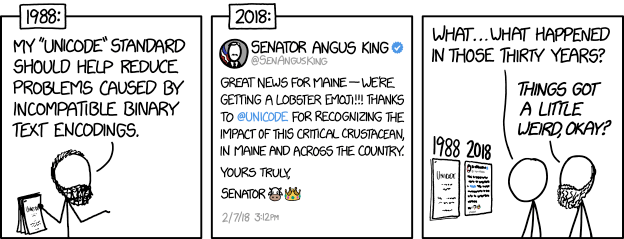Slides
Strings
Ref. WGR Chapter 8, Section 8.1, Working with strings
String literals
-
double-quotes allow interpolation and escaping
"\t" #=> "\t" name = "alice" "hello, #{name}" #=> "hello, alice" -
single-quotes are more literal-minded
'\t' #=> "\\t" there are many other bizarre ways to declare a string (see below)
substrings
s = "Ruby rocks"
s[5] #=> "r"
s[5,3] #=> "roc"
s[5,100] #=> "rocks"
s[-3] #=> "c"
s[2..6] #=> "by ro"
substring matching
s = "Ruby rocks"
s[/r../] #=> "roc"
s[/r../i] #=> "Rub"
substring setting
s = "Ruby rocks"
s["rock"] = "rule"
s #=> "Ruby rules"
adding strings
plus makes a new string
s = "dog"
s + "cow" #=> "dogcow"
s #=> "dog"
shovel changes the original string
s = "dog"
s << "cow" #=> "dogcow"
s #=> "dogcow"
plus-equal makes a new string but changes the variable
s = "dog"
s += "cow" #=> "dogcow"
s #=> "dogcow"
string interpolation
Takes any ruby expression, calls to_s on it, and smooshes it inside a string
"nothing compares #{1+1} u" #=> "nothing compares 2 u"
anything can go in there, including operators and quotes
"i love #{@girlfriend or "nobody"}"
string comparison
Strings are == if their characters are the same
"alice" == "alice" #=> true
Characters are compared in ASCII order (not Unicode or Collation order)
"a" < "b" #=> true
"a" < "Z" #=> false
The "flying saucer" operator is used for sorting
"a" <=> "b" #=> -1
["d", "o", "g"].sort #=> ["d", "g", "o"]
gsub
gsub munges a string
s = "rubber baby buggy bumpers"
s.gsub(/b/, "g")
s #=> "rugger gagy guggy gumpers"
- performs a regular expression search-and-replace on the string
-
gsub!modifies the string in place
split
split turns a string into an array
"apple banana cherry".split
=> ["apple", "banana", "cherry"]
- splits on whitespace by default
- or you can pass in a delimiter
join
join turns an array into a string
["apple", "banana", "cherry"].join
=> "applebananacherry"
- joins with the empty string by default
- or you can pass in a delimiter
["apple", "banana", "cherry"].join(' ')
=> "apple banana cherry"
Core Mungers Summary
| Method | turns a(n)... | into a(n)... |
|---|---|---|
| split | String | Array |
| join | Array | String |
| gsub | String | String |
| map | Array | Array |
more string methods
upcasedowncase-
capitalize- upcases the first letter and downcases the rest
-
reverse"stressed".reverse => "desserts"
-
strip- removes whitespace (not clothes) from the ends of the string
-
chomp- removes the final character, but only if it's a "\n"
center(width)
some of these have ! versions which modify the string in place
Encodings

- Files and Strings have encodings
-
default is ASCII, but can be set to UTF-8 or whatever
# encoding: utf-8
lots of ways to declare a string
- weird string literals
- here docs
weird string literals
- %Q --
%Q{don't worry, "man"}- just like double-quote only you don't need a backslash for "
- %q --
%q{don't #{interpolate}, "man"}- just like single-quote only you don't need a backslash for '
- any delimiter will do
-
%Q{...},%Q(...),%Q|...|, etc.
-
Multiline strings
newlines do not end a string
"Now is the winter of our discontent
made glorious summer by this son of York."
=>
ruby
"now is the winter of our discontent\nmade glorious summer by this son of York."
Here Docs
first_quatrain = <<END
My mistress' eyes are nothing like the sun;
Coral is far more red than her lips' red;
If snow be white, why then her breasts are dun;
If hairs be wires, black wires grow on her head.
END
Here docs with indentation
def second_quatrain
x = <<-HTML
<blockquote>
I have seen roses damask'd, red and white,
But no such roses see I in her cheeks;
And in some perfumes is there more delight
Than in the breath that from my mistress reeks.
</blockquote>
HTML
x
end
Here docs don't have to end the expression
x = <<-NUM.to_i * 10
5
NUM
x # => 50
Weird, huh?
Outline
- Strings
- String literals
- substrings
- substring matching
- substring setting
- adding strings
- string interpolation
- string comparison
- `gsub`
- `split`
- `join`
- Core Mungers Summary
- more string methods
- Encodings
- lots of ways to declare a string
- weird string literals
- Multiline strings
- Here Docs
- Here docs with indentation
- Here docs don't have to end the expression